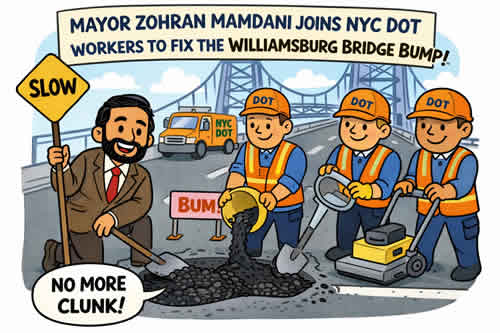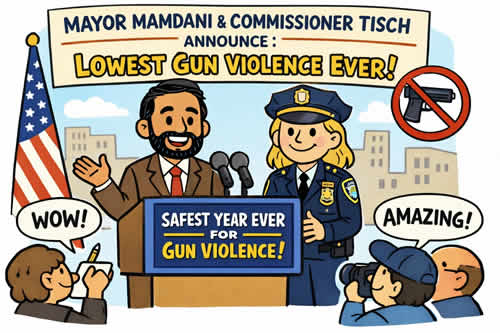New York City Mayor Eric Adams and New York City Department of Health and Mental Hygiene (DOHMH) Commissioner Dr. Ashwin Vasan today announced “Care, Community, Action: A Mental Health Plan for New York City,” a sweeping mental health agenda — with over $20 million in new commitments — that will invest in child and family mental health, addressing the overdose crisis, and supporting New Yorkers living with serious mental illness (SMI). Over the coming months, the city will roll out a pioneering telehealth program for New York City high school-aged teens that will both provide ongoing support and serve as an entry point to higher levels of care. The city will also launch suicide prevention pilots aimed at youth in crisis. With overdose deaths continuing to climb nationwide and in New York City, Mayor Adams also announced the city’s goal to reduce overdose deaths by 15 percent by 2025. Finally, building on efforts to support New Yorkers living with SMI, Mayor Adams announced plans to expand clubhouse capacity, double the number of New Yorkers living with SMI that get connected to community care, and expand the Behavioral Health Emergency Assistance Response Division (B-HEARD) program citywide. This agenda builds on $370 million in other investments by the Adams administration in New York City’s care continuum and crisis response.
The mental health agenda additionally outlines the city’s policy and advocacy agenda to effectively work with state and federal partners on these important issues. By addressing these three urgent, major challenges, this agenda will save lives and build a healthier New York City for working families and those most in need of care.
“The COVID-19 pandemic — with the stress, isolation, and anxiety it brought so many of us — pushed mental health to the forefront of the conversation,” said Mayor Adams. “When it comes to health, we can no longer ignore the brain and focus just on the body any longer; we must address the whole person, and the whole system. By investing in family and child mental health, addressing the overdose crisis, and supporting New Yorkers with serious mental illness, this plan focuses on where our need is greatest, going upstream to build a healthier city for all New Yorkers.”
“The city has experienced a once in a century pandemic, record high overdose deaths, and growing mental health needs for our young people. Therefore, a comprehensive mental health plan for New York City is more critical today than ever before,” said Deputy Mayor for Health and Human Services Anne Williams-Isom. “This plan centers people, care, and compassion at the core of each of its strategies, and focuses on those who have been previously left behind. From child and family mental health to those struggling with substance use issues to those with more severe conditions needing specialized supports, it sets forth new and sustainable ways to support every New Yorker who needs it.”
“This plan represents the city’s commitment to tackling the second pandemic of mental health needs in the wake of COVID-19, and it outlines a vision and a framework of a culture-shifting response for New York City,” said DOHMH Commissioner Dr. Vasan. “We must treat mental health as foundational to our society’s collective future, the same way we would our economy or the environment. We must act intentionally and ambitiously now, to shore up the system’s foundations and to innovate. By grounding this strategy in public health, focusing on populations with the greatest needs, as well as by working across levels of government and across stakeholders groups, we are showing how to bring all hands on deck to transform our mental health system, to save lives, prevent suffering and improve quality to life.”
Improving Child and Family Mental Health
Increasing access to mental health care for youth and their families and improving access to mental health care that is timely, culturally responsive, accessible, and affordable is critical to New York’s overall wellbeing.
While few models of a holistic youth mental health system exist, the long-term benefits of early intervention are potentially greater than with any other group. The need is also becoming clearer, with rates of depression among youth rising. As announced in Mayor Adams’ State of the City address in January, the city will invest $12 million to launch an expansive telehealth program for New York City high school aged teens, connecting them with mental health care. The city will also launch suicide prevention pilot programming at NYC Health + Hospitals for youth entering emergency departments for suicide attempts and community-based suicide prevention programming to specifically serve Black and Brown youth.
To further understand risk factors to a young person’s mental health better, the city will also bring together youth, families, and community partners to assess the impacts of social media on youth and develop strategies to address potential harms.
Addressing the Drug Overdose Crisis
The year 2021 was the deadliest year on record for overdose deaths in New York City, with racial and geographic disparities worsening — reflecting trends of the national crisis. To tackle the opioid epidemic, the mental health agenda outlines how the city will expand access to high-quality harm reduction services and sets a goal of reducing overdose deaths by 15 percent by 2025.
To meet this goal, Mayor Adams announced the city will expand non-fatal overdose response efforts to at least three additional hospital emergency departments and strengthen the 14 syringe service providers into a network of Harm Reduction Hubs with comprehensive services like a place to rest, addiction services, and medical and mental health services. The city will also expand drug-checking services and implement at least four Public Health Vending Machines that dispense naloxone to increase access in neighborhoods with high rates of overdoses — the first of its kind in New York City. New York will additionally increase support for children, families, and communities affected by the overdose crisis and work to reduce the number of people who develop problematic substance use.
Finally, the city will explore opportunities to expand overdose prevention centers (OPCs) to areas of the city with the highest rates of overdose death, continue to support the two existing OPCs with the goal of allowing them to operate 24 hours per day, and also continue to advocate for legal pathways to fund and operate OPCs.
Expanding Serious Mental Illness Support
This plan focuses on connecting New Yorkers with SMI with four pillars of care: health care, housing, community, and crisis response. The city aims to double the number of connections of New Yorkers living with SMI with community-based care over the next four years, putting thousands more New Yorkers on a path to stability. As part of this effort, the city will also expand mobile treatment capacity over the next year to serve 800 more people with high service needs through Intensive Mobile Treatment (IMT) and Assertive Community Treatment (ACT). To expand housing options for people with SMI, the city will add an additional 8,000 units of supportive housing, and invest $7 million more to significantly increase Clubhouse capacity over the next four years.
The mental health agenda additionally outlines how the city will strengthen the crisis response systems, expanding the B-HEARD pilot program citywide to respond to more mental health-related crises with a health-led response and adding two peers to every mobile crisis team to divert people in crisis from unnecessary hospitalizations. Finally, the city will work in partnership with state partners to develop a streamlined referral system to care, expediting referrals from hospitals, jails, and shelters.
“As New York’s largest provider of behavioral health services, NYC Health + Hospitals welcomes this historic plan,” said NYC Health + Hospitals President and CEO Mitchell Katz, MD. “Meeting the behavioral health needs of all New Yorkers has long been core to our mission, and this thoughtful strategy will bring critical new momentum to this work at a pivotal moment for our city. We thank the mayor for moving boldly and making this issue a priority.”
“This is a remarkable moment to serve as a mental health provider and leader in New York City,” said NYC Health + Hospitals System Chief of Behavioral Health and Co-Deputy Chief Medical Officer Omar Fattal, MD, MPH. “This plan is a significant leap forward for our city’s mental health system. It will deliver a major boost to our ongoing work, provide our hospitals with much-needed tools, and connect our patients to much-needed services. We look forward to coordinating with other agencies, community leaders, and partners to ensure its success.”
“We are proud to be a part of the mayor’s comprehensive mental health plan. This plan is essential in closing disparity gaps in mental health care” said Mayor’s Office of Community Mental Health (OCMH) Director Eva Wong. “We know that high-quality, compassionate, health-led, emergency mental health care, such as that provided by OCMH’s B-HEARD, is crucial to connecting New Yorkers to community-based support and longer-term care, which is why the citywide expansion of B-HEARD is needed and applauded. In service of this bold plan, OCMH will continue to partner across city agencies and with communities to strengthen protective factors and resilience as we work together to improve the health and wellbeing of all New Yorkers.”
“Our young people are dealing with more stressors and challenges than ever before, particularly as we continue to recover from the pandemic. In order for our schools to continue to serve as sanctuaries for our kids and provide the wraparound supports, they deserve, we must continue to underline mental health and wellbeing in our schools,” said New York City Department of Education Chancellor David C. Banks. “Access to robust mental health supports will continue to be an essential component in raising our future leaders and community members. New York City public schools is proud to be prioritizing this work alongside Mayor Adams and our agency partners to set our kids up for current and future successes.”
“This transformative plan prioritizes equity by centering the needs of those who have been the most marginalized,” said Mayor’s Office of Equity Commissioner Sideya Sherman. “We are proud to support new trauma-informed healing, youth mental health services, and other tailored mental programming that will reach a diverse range of BIPOC and LGBTQ+ New Yorkers. Through a network of care, services, and community-based support, the city is meeting New Yorkers where they are and providing the vital resources necessary to improve one’s mental health and well-being.”
“Mental health is a thread that runs through all our work at the Office of Chief Medical Examiner, and we are ready to do our part in this comprehensive plan to focus and coordinate efforts on behalf of the New Yorkers most in need,” said New York City Chief Medical Examiner Dr. Jason Graham. “As our city continues to recover from the pandemic and faces challenges including the ongoing crisis of overdose deaths, we look forward to working with Mayor Adams, Deputy Mayor Williams-Isom, and all our agency colleagues to support those experiencing the loss of loved ones and help save lives.”
“Long-term disinvestments in mental health support systems have been detrimental to the city’s most vulnerable communities, leaving them at greater risk of negative mental health outcomes and socioeconomic instability,” said New York City Department of Social Services Commissioner Gary P. Jenkins. “We applaud Mayor Adams for recognizing the need for a comprehensive and holistic mental health plan that prioritizes the needs of our most at risk communities by focusing on early prevention, improved access to affordable evidence-based intervention for those in need of treatment, and harm reduction for individuals at risk of drug overdose. We look forward to coordinating with other city agencies, non-profits, and community groups as we work to help vulnerable New Yorkers struggling with mental health recover and stabilize their lives.”
“This comprehensive, innovative plan to holistically address the mental health needs of New Yorkers, particularly children, youth, and families, will improve the lives of countless New Yorkers,” said New York City Administration for Children’s Services Commissioner Jess Dannhauser. “We are grateful to Mayor Adams, Deputy Mayor Williams-Isom, Dr. Vasan, and our sister agencies for collaborating on this plan, and look forward to working together to focus on the mental health needs of New York City’s families that are in the most need.”
“We commend Mayor Adams and his health care team on the plan released this week to combat the mental health crisis here in New York City,” said US Department of Health and Human Services Regional Director Dr. Dara Kass. “Our increased federal investments in behavioral health resources, together with strong local efforts focusing on child and family mental health, the overdose crisis and other initiatives, are critically important as we work together to surmount our national mental health crisis.”
“It is no secret that New York has a mental health and drug overdose crisis,” said New York State Senator Andrew Lanza. “Acknowledging and directing resources to these important issues is the first step to fixing them. I am on Mayor Adams side with his focus on addressing the mental health emergency we are facing and look forward to working with him to address these life and death issues, to make New York a better place to live and thrive.”
“Mental health care is health care, and we owe it to all New Yorkers to ensure that those struggling get the help they need,” said New York State Senator Brad Hoylman-Sigal. “New Yorkers bear witness to the mental health crisis on our streets and in our schools every day. We must take aggressive and progressive action to prevent youth suicide prevention in our schools, foster family mental well-being, curb substance use, and treat those with serious mental illnesses. I applaud Mayor Adams and Health Commissioner Vasan for moving these priorities forward and bettering New Yorkers’ mental health, safety, and quality of life.”
“I look forward to partnering with Mayor Adams on his ambitious mental health agenda that proactively uplifts and empowers vulnerable New Yorkers,” said New York State Assemblymember Jenifer Rajkumar. “Currently, 120,000 students in New York City public schools suffer from severe depression. The mayor’s mental health plan will cut through barriers and stigmas to reach these young people, bringing them the treatment they need by engaging them through school, implementing suicide prevention programs, and providing culturally competent telehealth services. There has also been a 78% increase in overdose deaths in our city since the pandemic. The mayor’s plan will save lives by proactively addressing this addiction crisis. Today, the mayor also commits to saving New Yorkers with serious mental illness by increasing our capacity to treat all 240,000 of them. I applaud the mayor’s relentless dedication to reaching New Yorkers who are struggling and giving them the support they need to thrive.”
“I commend Mayor Adams and Health Commissioner Dr. Vasan for their efforts to address mental health, youth suicide and overdoses,” said New York State Assemblymember Manny De Los Santos. “Without adequate access to mental health services, many of our loved ones struggle to focus at work or in the classrooms, and may turn to drug use and self-harming behaviors. The pioneering telehealth program for high school students struggling with depression; expanding community care capacity to serve New Yorkers living with severe mental illness; and efforts to reduce overdoses– all will help us save lives and build a safer and healthier New York City.”
“So many New Yorkers facing serious mental illnesses have nowhere to turn. Our city urgently needs high-quality, accessible care, so people who are struggling get the support they deserve,” said New York City Comptroller Brad Lander. “Mayor Adams’ commitment to tackling the mental health crisis will provide necessary services for New Yorkers in need and save thousands of lives.”
“Across New York City, our neighbors and friends are experiencing mental health and substance use challenges that far too often are faced alone. We must do more to support those who are in need,” said Manhattan Borough President Mark Levine. “By creating an agenda that focuses on families and young people, on overdose prevention, and on supporting those with serious mental illness, the city is showing that it’s taking these needs seriously. I’m looking forward to working with the mayor and Commissioner Vasan on expanding programming for young people, continuing to prevent overdoses across the city, expanding programs like clubhouses that provide peer-led support for New Yorkers in need.”
“Our city and nation are in the midst of a mental health crisis coming out of the COVID-19 pandemic, one of the most destabilizing events of our lifetimes. Our kids lost out on vital social development time, those vulnerable to substance misuse lost support systems and those already struggling with their mental health felt more alone than ever,” said Queens Borough President Donovan Richards Jr. “The work ahead of us to heal the wounds we suffered as a society will be long and daunting, but it has never been more important because countless lives and futures hang in the balance. I look forward to working with the Mayor’s Office and the Department of Health and Mental Hygiene as we invest heavily in the wellness of all our neighbors — regardless of age, circumstance, or socioeconomic status.”
“The mayor’s initiative truly addresses an issue that the people of New York City are struggling with,” said Staten Island Borough President Vito Fossella. “The increase in mental health needs for the adults and children of New York City in this post-pandemic period is well documented. Though one cannot possibly predict the long-term effect of COVID-19 isolation on mental health issues in children, we do see an increased incidence of mental health needs for both children and adults. The dramatic increase in the suicide rate shocks all of us. In addition to mental health issues, substance use continues to plague New Yorkers and we have all seen the devastation that families encounter when their loved one dies of an overdose. Access to treatment and support will greatly help New Yorkers during these difficult times. The mayor’s program will help to address these difficult issues facing our communities.”
“We are leaving our children behind when we fail to invest in their mental health and wellness,” said New York City Councilmember Shaun Abreu. “Our youth have had a rough go of it these last few years, and Mayor Adams’ agenda is a vital intervention. Together, we can build the necessary services that these families and these kids deserve.”
“Mayor Adams’ three-prong mental health plan is a major step towards providing comprehensive support to all New Yorkers,” said New York City Councilmember Kamillah Hanks. “The expansion of child and family mental health services, addressing the overdose crisis, and supporting those with serious mental illness will ensure that all New Yorkers receive the care they need. I am proud to support this initiative and will work with my fellow council members to ensure its success.”
“The mental health crisis in New York City today is a very serious problem and I commend Mayor Adams and Health Commissioner Dr. Vasan for trying to tackle this crisis,” said New York City Councilmember Ari Kagan. “I strongly support additional resources for mental health services and overdose prevention programs, as well as focusing on helping our youth. I also call on our state government to assist New York City with additional mental health beds in specialized centers and clinics. Only together we can overcome this tremendous challenge.”
“Today’s announcement unveiling the administration’s mental health agenda for our city shows that the mayor is prioritizing the mental wellbeing of all New Yorkers,” said New York City Councilmember Linda Lee, chair, Committee on Mental Health, Disabilities, and Addictions. “We have all seen how the devastating effects of isolation have had an effect on the mental welfare of our children who have balanced learning with the realities of a pandemic. Our city has also dealt with the brunt of the opioid crisis, with data showing us that we lose one New Yorker every 3 hours due to a drug-related overdose. I applaud the efforts laid out by Mayor Adams and Commissioner Vasan to address the shortcomings currently present in our system, and I look forward to seeing future details that will be crucial in implementing this plan to adequately and accurately provide culturally competent mental healthcare to address this ongoing crisis.”
“I applaud Mayor Adams and this administration for implementing a multi-faceted plan that focuses on the critical mental health issues affecting our communities, prioritizes family and child mental health, addresses the overdose crisis, and expands support for those who need these services the most. Mental health issues among young people are often overlooked, and the city’s proactive approach to addressing this problem is both timely and essential. The overdose crisis is a public health emergency that requires urgent attention, and I look forward to seeing these resources rolled out across our city in the near future,” said New York City Councilmember Farah Louis.
“The pandemic has exacerbated mental health issues across our city,” said New York City Councilmember Mercedes Narcisse. “New Yorkers who struggle with mental health issues require resources commensurate with the seriousness of the matter itself. I applaud Mayor Adams for issuing this bold, ambitious, and culturally competent agenda to address this crisis in our city. Health is wealth, and that certainly includes the mental health and wellbeing of our families and children. I look forward to working with the Adams’ administration to increase access to mental health care across our city.”
“I applaud Mayor Adams for rolling out a new agenda promoting mental health and supporting New Yorkers in crisis,” said New York City Council Majority Leader Keith Powers. “The agenda demonstrates the city’s commitment to ensuring New Yorkers can live healthy lives and that those in crisis have access to urgently needed resources.”
“New York deserves a comprehensive, person-centered health care system that uses evidence-based models to protect and promote the wellbeing of all communities across the city. There are too many gaps in the mental health care system, and I look forward to working with Mayor Adams on advancing a mental health agenda to support New Yorkers in crisis and save lives,” said New York City Councilmember Carlina Rivera.
“New York City is experiencing an unprecedented mental health and addiction crisis, particularly among young people,” said New York City Councilmember Lynn Schulman, chair, Health Committee. The comprehensive plan announced today by Mayor Adams is a substantive step in addressing these longstanding, hard core issues. I look forward to working with the administration and the Department of Health and Mental Hygiene to improve the health of all New Yorkers.”
“Our city is facing a mental health crisis, and this is an opportunity for our families and neighbors to access critical resources that meet their needs. As we expand mental health services to children and families, we are protecting the livelihood of our communities,” said New York City Councilmember Marjorie Velázquez. “We cannot continue to allow mental health to be swept under the rug; by taking action, we can and will save the lives of many New Yorkers from all backgrounds.”
“The Adams administration understands that addressing escalating mental health needs is a priority, and investing in community-based, trauma-informed mental health services is essential to ensuring people receive the care they need,” said Jody Rudin, president and CEO, The Institute for Community Living (ICL). “We are encouraged by the focus on children and families and meaningful investments in mobile and crisis treatment programs, which are the gold standard in delivering quality outcomes for people who have fallen through the cracks. ICL has been on the ground for nearly four decades, providing a whole health approach to help New Yorkers with the most acute needs get better, and we look forward to continuing to partner with the city and state to support New Yorkers with the most serious behavioral health challenges.”
“As we continue to face the Opioid Crisis, what the nation needs, is true harm reduction,” said St. Anne’s Corner of Harm Reduction (SACHR) Founder and CEO Joyce Rivera. “Looking at the success of Overdose Prevention Centers in New York, Canada, and Europe, it is easy to see that decency works. We must lead with empathy, practice mercy, and provide safety to all of our neighbors if we wish to see an end to the countless lives lost to this epidemic.”
“The Jed Foundation (JED) enthusiastically supports this bold agenda and the special care Mayor Adams, Dr. Vasan, and New York City have taken to prioritize emotional health and reduce suicide, alleviating suffering and saving young lives,” said JED CEO John MacPhee. “The Jed Foundation is thrilled to closely collaborate and support expansion of culturally competent mental health and suicide prevention efforts city-wide, elevating timely, equitable, and accessible support to care. This plan’s comprehensive approach to mental health will strengthen communities of care in New York City and help all young people thrive.”
“The NYU Silver School of Social Work has long promoted the mental health of children, youth and families in our education, practice, and scholarship. Young people in our city and nationally are experiencing increasing rates of mental health challenges, and the need to address them is urgent. Furthermore, contributing toward the training and staffing of New York City’s mental health workforce is a key part of our mission,” said Michael Lindsey, Paulette Goddard Professor of Social Work; dean, NYU Silver School of Social Work; Aspen Health Innovators Fellow. “Therefore, we commend Mayor Adams’ plan to prioritize prevention and care for youth, especially in communities that have been marginalized and disproportionately impacted by the effects of the pandemic. Investing toward good mental health in all communities is important in order for New York to thrive, now and in the future.”
“The mayor’s plan is an acknowledgement of the critical needs faced by those New Yorkers struggling with mental health and substance use challenges. Each of these goals – particularly those focused on children, youth, and families, those with serious mental illness and those at risk for overdose – are a concerted effort at addressing the overwhelming and unaddressed needs of the most vulnerable,” said Jorge Petit, CEO and president, Services for the UnderServed. “New York City needs to further eradicate systemic inequities, elevate the health care workforce by providing a living wage, eliminate unnecessary inter-agency barriers and hold the entire health care ecosystem accountable for timely and quality services and outcomes. Only then can we move from crisis to wellness and wellbeing for all New Yorkers.”
“We are extremely pleased to see the intentional and expanded mental health agenda from Mayor Adams,” said Kimberly Williams, president and CEO, Vibrant Emotional Health. “The pillars he names – family and child mental health, addressing overdose crisis, and expanding serious mental illness supports – have never been more important to address in our city. Vibrant looks forward to collaborating with the city to ensure that New Yorkers have the supports available to them when and how they need them.”
“New York City has often led the nation with behavioral health services. With this new mental plan, New York City once again leads with a commitment to bring a public health approach, ensuring recovery for populations challenged by behavioral health issues, including our youth and other family members with serious mental illness or addiction,” said Vanna Health co-founder Thomas R. Insel, MD.
“The creation of a three-part mental health plan including both child and family mental health is commendable,” said Ron Richter, CEO, JCCA. “We know the mental health crisis among youth is reaching unprecedented levels and agree with the mayor that providing access to high-quality and culturally competent mental health care to all New Yorkers at a time when the needs of children and families, particularly those that are historically underserved, is of utmost importance.”
“Creating a meaningful plan to address mental health requires multiple changes to be pursued at once. Thankfully, this plan recognizes this complexity and acknowledges that a primary driver reinforcing so many of the problems the city faces are structural and in need of a redesign,” said Benjamin F. Miller, PsyD, past president of the Well Being Trust and adjunct professor, Stanford School of Medicine. “The New York City plan applies a strong public health lens throughout and incorporates prevention and early intervention strategies as often as it offers new and novel ways to increase access. Implementing this plan, as written, will have far reaching implications for the City of New York and other cities looking to make robust and consequential changes for mental health and substance misuse.”
“As one of the largest providers of health care to New Yorkers experiencing homelessness, we know that serious mental illness, chronic homelessness, and substance use disorder create profound barriers to stability and wellbeing. We applaud the expansion of mental health programs and investments for New Yorkers with serious mental health concerns, who too often fall through the cracks,” said Eric Rosenbaum, president and CEO, Project Renewal. “We look forward to continuing to work with the city to ensure our neighbors facing these challenges have access to coordinated, trauma-informed, and culturally competent community-based care.”
“Mental health is public health. By balancing prevention, treatment, and community investment, this plan can help New Yorkers access the resources that support mental health at the population level, shaping a healthier city for all,” said Sandro Galea, dean, Boston University School of Public Health.
“The Department of Health and Mental Hygiene’s plan is appropriately ambitious, grounded in empirical evidence, and targeted at the populations most in need. I commend the department for taking on this compelling and thorough response to very challenging problems and am optimistic that it will show success,” said NYU Robert F. Wagner Graduate School of Public Service Dean Sherry Glied. “I am especially heartened to see the focus on continuous learning and evaluation, so that this plan can advance further as the department gains experience during its implementation.”
“This is a visionary plan focusing on the most urgent priorities with an emphasis on prevention and early intervention through improved access to quality care in community contexts and addressing social determinants, in recognition that a specialist-delivered treatment-focused, approach is inadequate to address the high and rising burden of suffering due to mental health and substance use problems,” said Vikram Patel, professor, Harvard Medical School’s Department of Global Health and Social Medicine.
“We applaud Mayor Adams for confronting the city’s mental health crisis, including through these important initiatives to expand services for New Yorkers living with serious mental illness. VNS Health has been a frontline behavioral health services provider for over 35 years, and we know firsthand that continued focus and investment in these programs is critical to their success. We look forward to working with Mayor Adams and Commissioner Vasan to serve the neediest and most vulnerable New Yorkers,” said Jessica Fear, senior vice president of Behavioral Health, VNS Health.
“The stigma against mental illness and drug use have frozen too many leaders into inaction for too long,” said Jennifer Jones Austin, CEO of the Federation of Protestant Welfare Agencies. “We have a lot of work to do but this is an important beginning to build a system that lifts people up.”
NYC.gov
Big New York news – Midtown Tribune New York news










